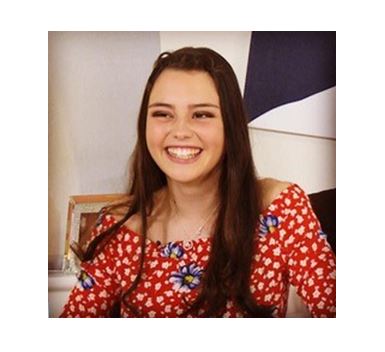Addie’s Story
Addie was a young girl, carefree, with a zest for life. She loved her family and friends. She enjoyed school and was always keen to try new things. Addie had a passion for sport, playing football and netball and training regularly with a local athletics club.
In 2011, when Addie was 9, her life and ours changed forever when she was diagnosed with a rare form of bone cancer, spindle cell sarcoma. Surgery removed Addie’s tibia bone, which was replaced with titanium metal and she spent several months in hospital having chemotherapy. Addie recovered and she returned to a relatively normal life.
For the next few years, there was some obstacles to overcome, with regular visits to hospital and further surgery when the prosthesis in Addie’s leg broke but life was happy and we began to feel less anxious about check-ups, feeling fortunate to have come through cancer and survived. We began to relax, enjoy holidays and make plans for the future. Addie loved school, she was vibrant and loud and had a large group of friends who she loved to spend time with. She was the life and soul of the party.

The Addie Brady Foundation aims to support much needed research into high grade paediatric brain tumours with the hope of finding a cure and better treatment for childhood brain cancer.
In addition, it supports further study, awareness and support for families with Li Fraumeni Syndrome. (LFS)
Addie was our inspiration and we are determined for her strength and bravery to be an inspiration for all.
However, five years later in September 2016, following a family party, Addie got up and was unable to speak and she appeared to be in a trance-like state. She was rushed by ambulance into a nearby hospital. During the journey, she experienced several seizures – it was terrifying and we did not anticipate what was to come.
Addie was stabilised but scans revealed a mass on her brain. She was transferred to Great Ormond Street Hospital, where a lumbar puncture and biopsy confirmed Addie had an aggressive, high grade, diffuse, inoperable brain tumour. More shockingly, the brain tumour was a primary cancer, unrelated to the first cancer. We were told Addie wouldn’t survive and life expectancy was 12 – 18 months with treatment to extend life only. We requested second opinions in and outside of the UK but there was no further treatment available. Genetic testing revealed Addie had a mutation of the TP53 gene and she was diagnosed with Li-Fraumeni Syndrome (LFS).
Addie’s tumour remained stable for just over a year but it then became aggressive and although at the time we were offered a trial, sadly, it became apparent very quickly that Addie was too poorly and further scans revealed the disease had spread to the spine and to other parts of the brain – the trial was no longer an option.
The disease was brutal and took its toll, eventually taking her mobility, sight and mind. Addie died at home on 1st February 2018. She was just 16 years old.
Addie was beautiful, loving and funny. She died as she had lived – complaining little, never acting as a victim and trying to see the positive in life. In her short life, she experienced lots and touched the hearts of everyone she met.

Addie was an extraordinary young girl, with a big, strong heart and an even bigger smile.
We hope Addie’s lion heart legacy will live on, helping and supporting others in the fight against cancer.











Li-Fraumeni Syndrome (LFS) is an inherited familial predisposition to a wide range of certain, often rare, cancers. This is due to a change (mutation) in a tumor suppressor gene known as TP53. The resulting p53 protein produced by the gene is damaged (or otherwise rendered malfunctioning), and is unable to help prevent malignant tumours from developing. Children and young adults are susceptible to developing several multiple cancers, most notably soft-tissue and bone sarcomas, breast cancer, brain tumours, adrenocortical carcinoma and acute leukaemia. Other cancers seen in LFS patients include gastrointestinal cancers and cancers of the lung, kidney, thyroid, and skin, as well as in gonadal organs (ovarian, testicular, and prostate.)